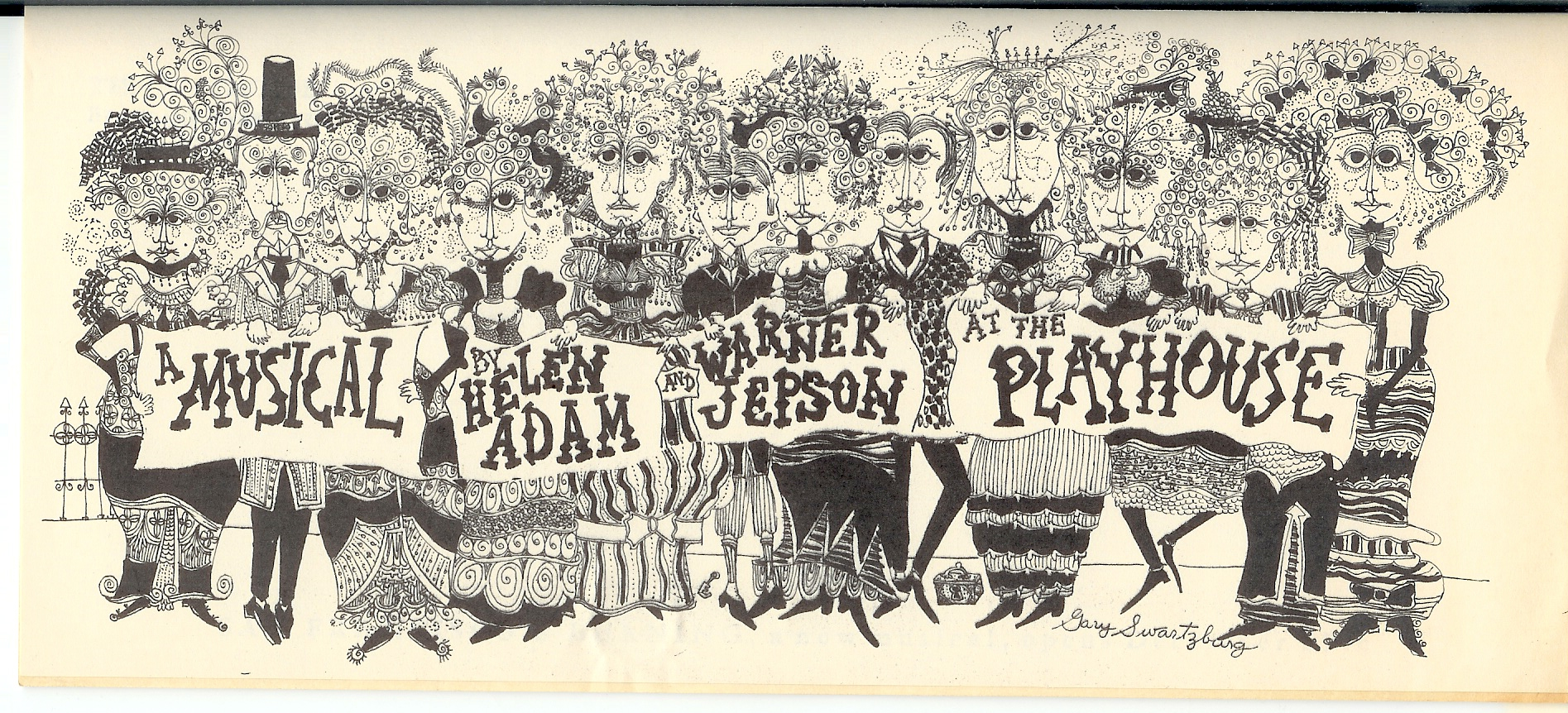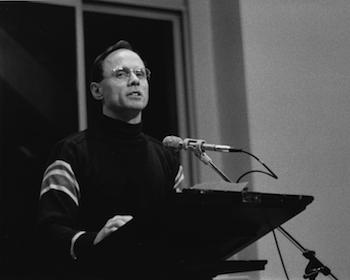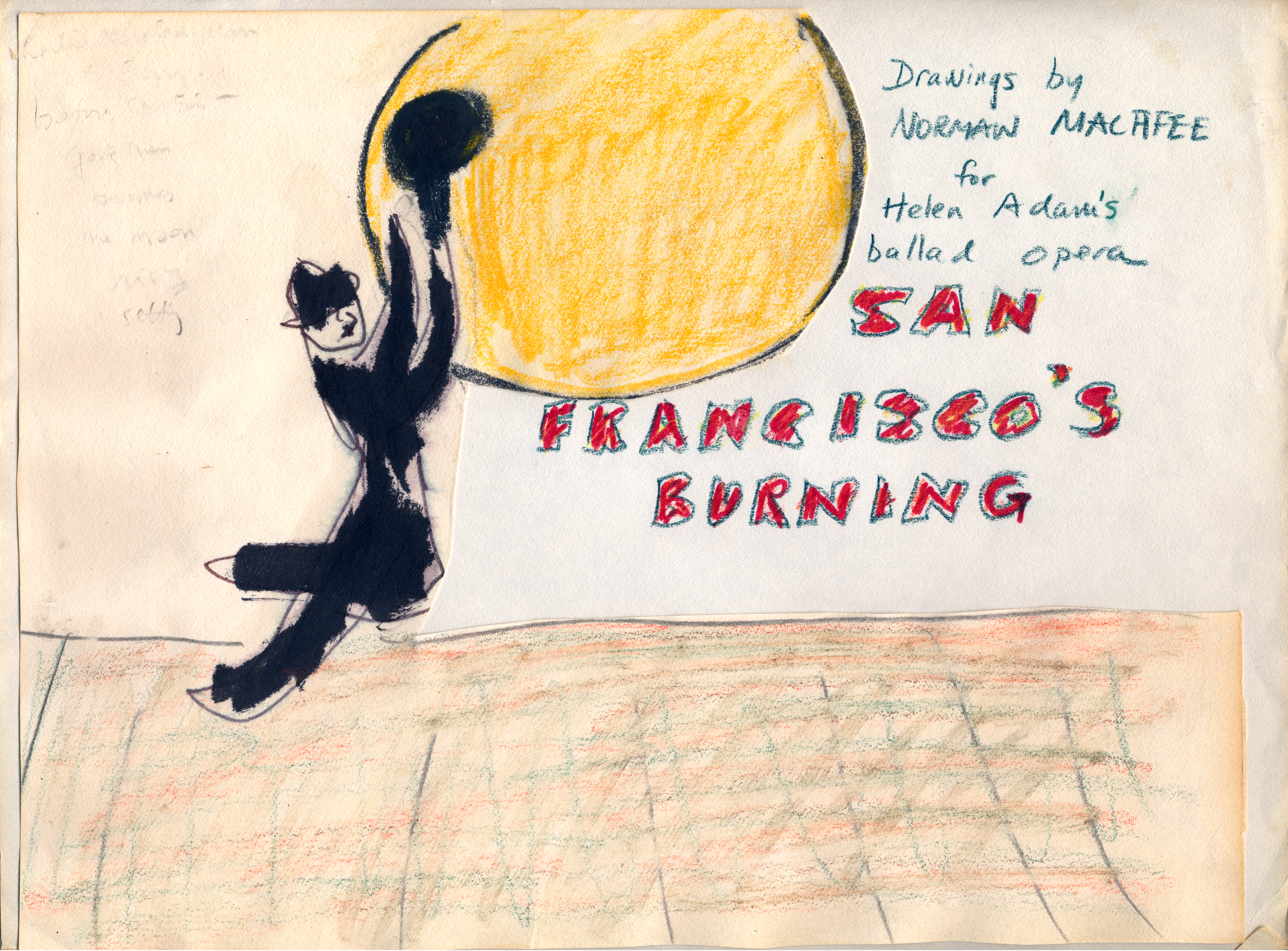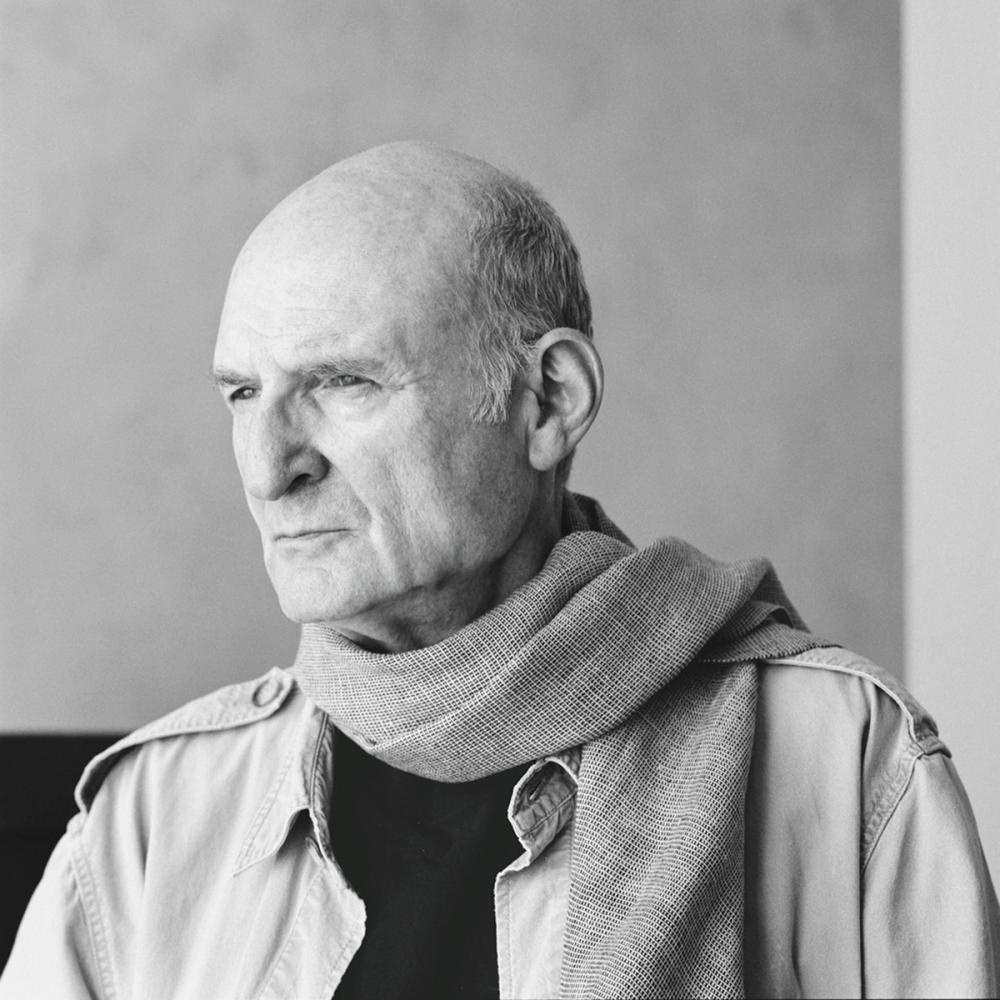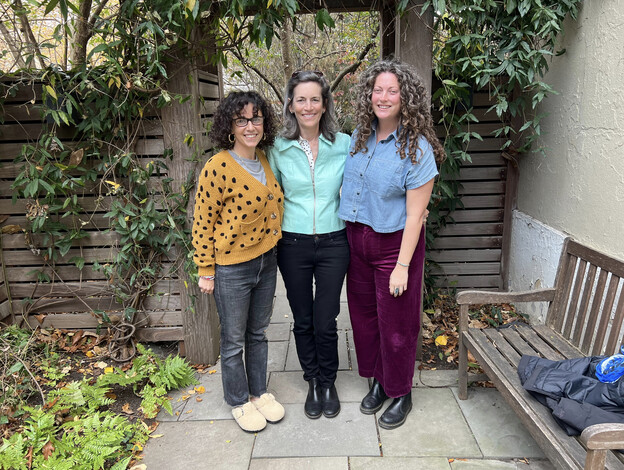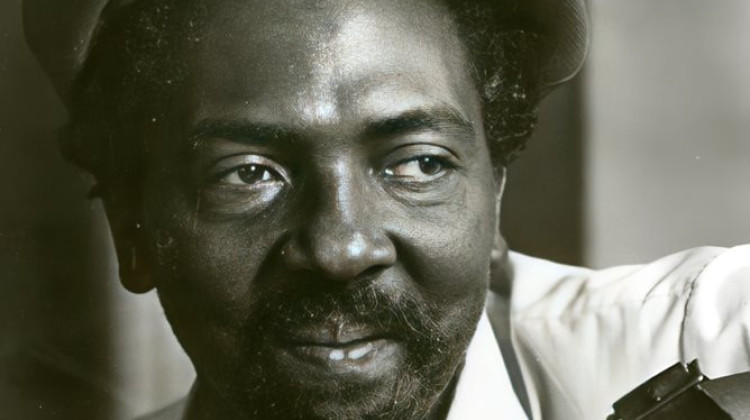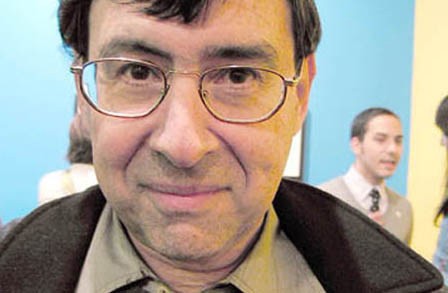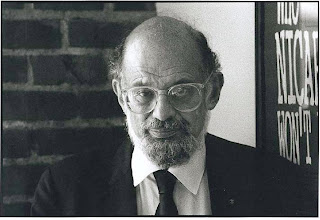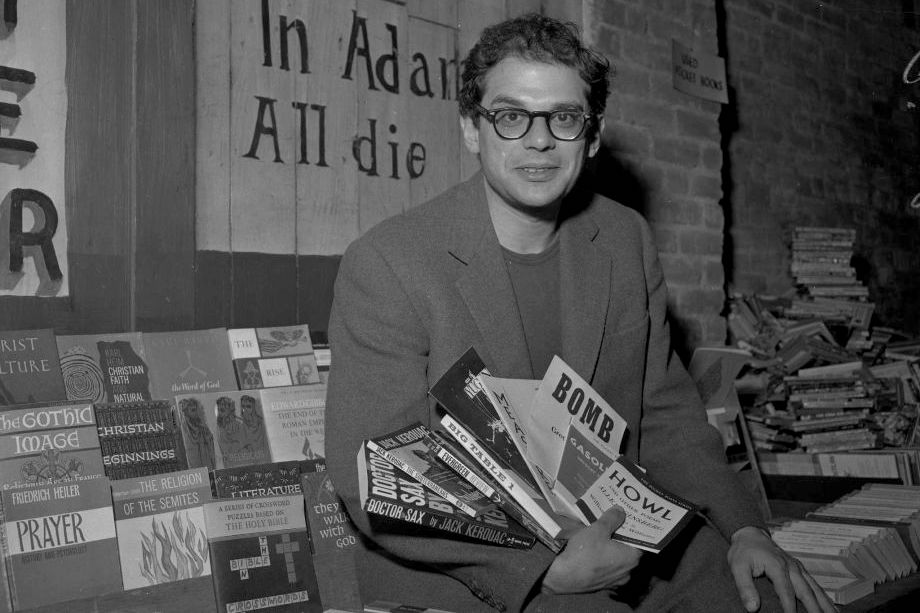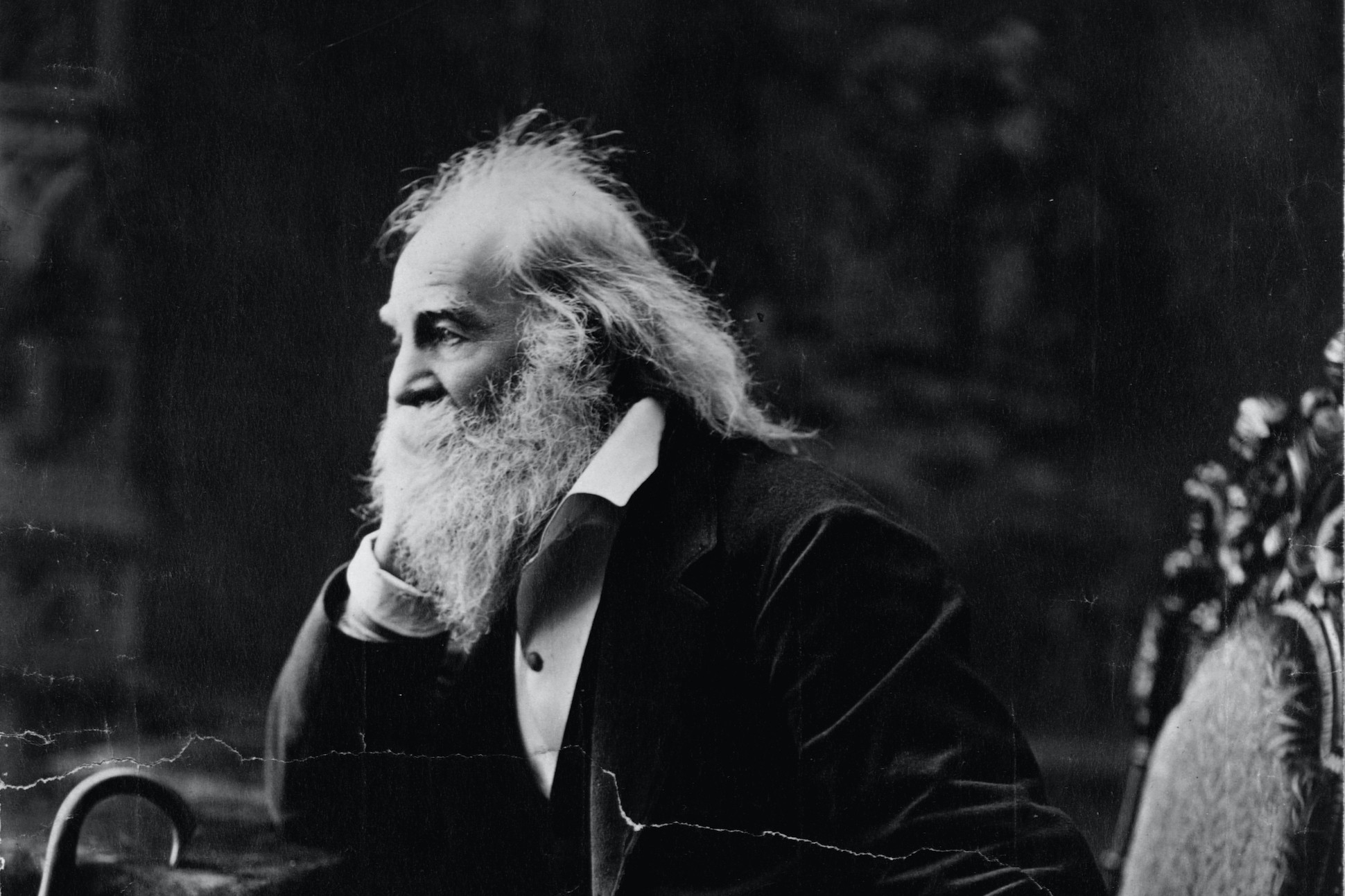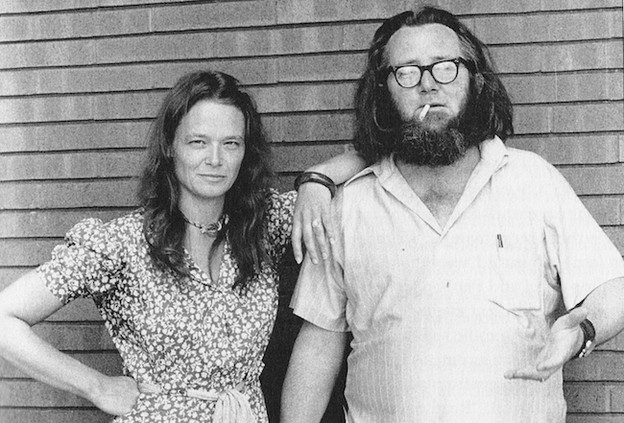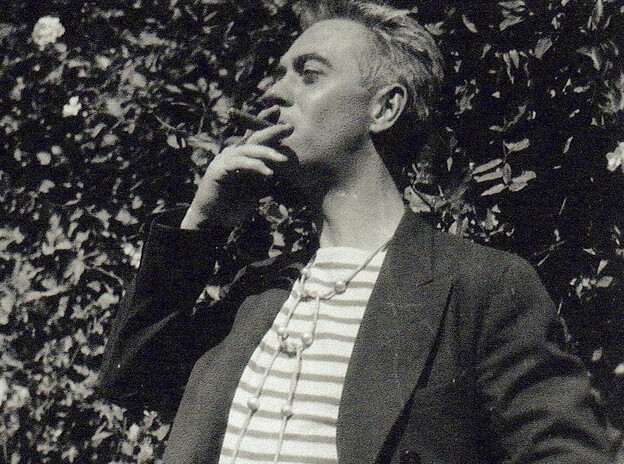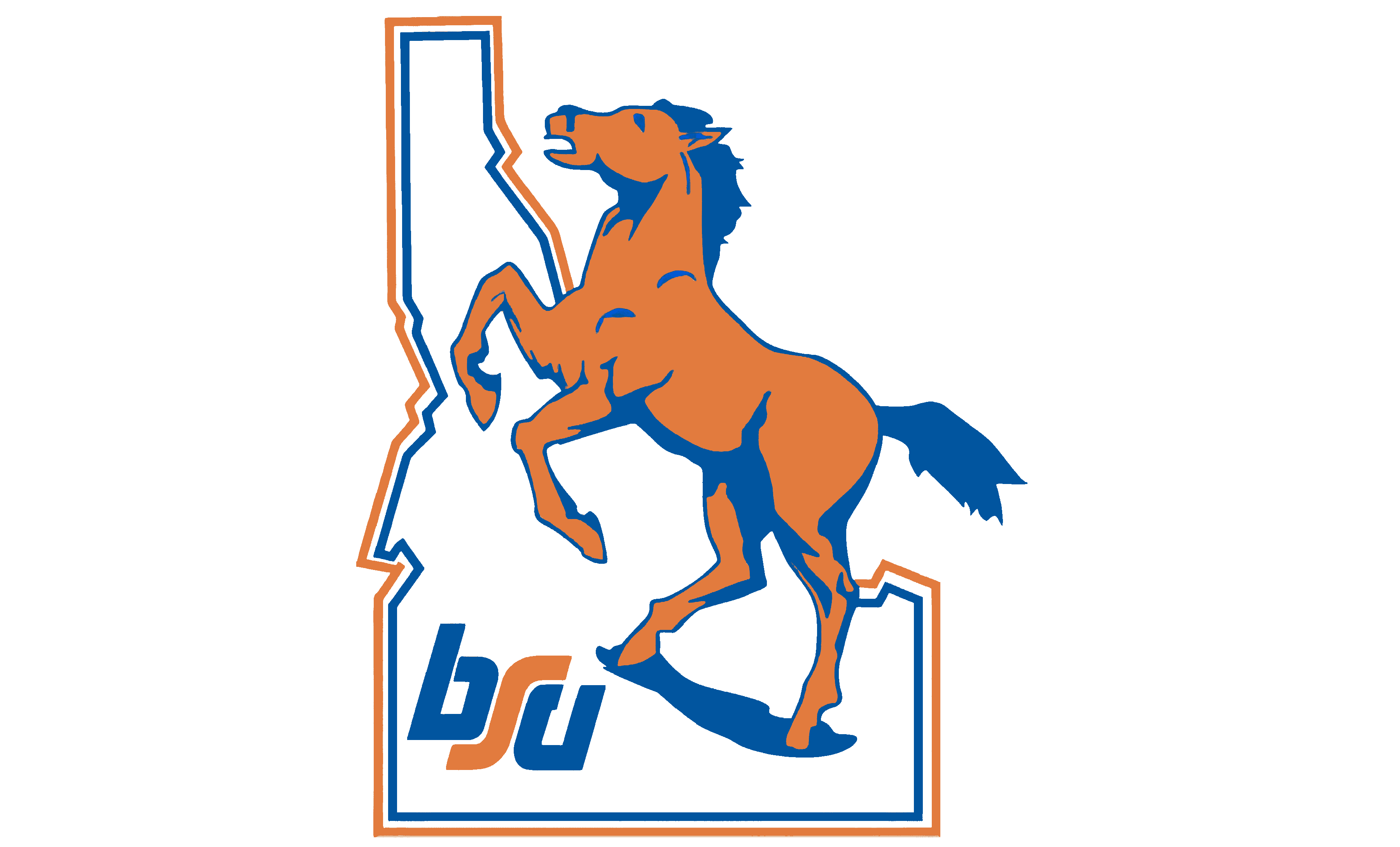Featured resources
From "Down To Write You This Poem Sat" at the Oakville Gallery
- Charles Bernstein, "Phone Poem" (2011) (1:30): MP3
- Caroline Bergvall, "Love song: 'The Not Tale (funeral)' from Shorter Caucer Tales (2006): MP3
- Christian Bôk, excerpt from Eunoia, from Chapter "I" for Dick Higgins (2009) (1:38): MP3
- Tonya Foster, Nocturne II (0:40) (2010) MP3
- Ted Greenwald, "The Pears are the Pears" (2005) (0:29): MP3
- Susan Howe, Thorow, III (3:13) (1998): MP3
- Tan Lin, "¼ : 1 foot" (2005) (1:16): MP3
- Steve McCaffery, "Cappuccino" (1995) (2:35): MP3
- Tracie Morris, From "Slave Sho to Video aka Black but Beautiful" (2002) (3:40): MP3
- Julie Patton, "Scribbling thru the Times" (2016) (5:12): MP3
- Tom Raworth, "Errory" (c. 1975) (2:08): MP3
- Jerome Rothenberg, from "The First Horse Song of Frank Mitchell: 4-Voice Version" (c. 1975) (3:30): MP3
- Cecilia Vicuna, "When This Language Disappeared" (2009) (1:30): MP3
- Guillaume Apollinaire, "Le Pont Mirabeau" (1913) (1:14):
MP3
- Amiri Baraka, "Black Dada Nihilismus" (1964) (4:02): MP3
- Louise Bennett, "Colonization in Reverse" (1983) (1:09): MP3
- Sterling Brown, "Old Lem " (c. 1950s) (2:06): MP3
- John Clare, "Vowelless Letter" (1849) performed by Charles Bernstein (2:54): MP3
- Velimir Khlebnikov, "Incantation by Laughter" (1910), tr. and performed by Bernstein (:28) MP3
- Harry Partch, from Barstow (part 1), performed by Bernstein (1968) (1:11): MP3
- Leslie Scalapino, "Can’t’ is ‘Night’" (2007) (3:19): MP3
- Kurt Schwitters, "Ur Sonata: Largo" performed by Ernst Scwhitter (1922-1932) ( (3:12): MP3
- Gertrude Stein, If I Told Him: A Completed Portrait of Picasso (1934-35) (3:42): MP3
- William Carlos Willliams, "The Defective Record" (1942) (0:28): MP3
- Hannah Weiner, from Clairvoyant Journal, performed by Weiner, Sharon Mattlin & Rochelle Kraut (2001) (6:12): MP3
Selected by Charles Bernstein (read more about his choices here)
|
Posted 7/18/2024
Today we're proud to highlight several changes to our author page for poet and playwright Helen Adam, which bring together resources related to her magnum opus, San Francisco's Burning, a lyric drama co-written with her sister Pat. We've long been proud to host Charles Ruas's production of the radio play for the Audio Experimental Theatre, which was first broadcast on New York City's WBAI FM on July 17th, 1977. In addition to the two Adam sisters, the radio play's cast also included Marilyn Hacker, Robert Hershon, and Barbara Wise in major roles. Those recordings have long been augmented by Kristin Prevallet's "Notes on San Francisco's Burning" taken from her excellent A Helen Adam Reader (2007), which features some charming anecdotes about the drama's production, including this recollection from musical director Rob Wynne regarding the "structured chaos" of the recording process: "It took a few months to pull it all together, often ending up after a session at Helen & Pat's apartment, surrounded by her collection of agates and stones, in which she saw images and stories. She always served celery filled with peanut butter, a bizarre but oddly delicious combination."
That latter staging is now paired with another: a 1962 recording adapted from a 1961 production directed by Kermit Sheets for the San Francisco Playhouse, which features the drama's original electronic soundtrack, composed by Warner Jepson. Jepson, a wizard on the difficult-to-master Buchla synthesizer and a prominent figure in San Francisco's avant garde music scene, was kind enough to share these original recordings with us prior to his death in 2011. While we've only posted the production itself on Adam's page, there's also a link to additional photographs, press clippings, and other ephemera from the production on Jepson's PennSound author page. Finally, we've also added a link to Norman MacAffee's "Sixteen Drawings for Helen Adam's San Francisco's Burning" at Jacket2, which we mentioned in last week's tribute to the late artist.
Taken together, these provide listeners the potential to truly immerse themselves in the Adam sisters' iconic and iconoclastic oddball drama. You can find all of the aforementioned resources, as well as more work from the poet on PennSound's Helen Adam author page.
Posted 7/16/2024
We start this new week off with a new video of Piotr Gwiazda (shown at right) reading from Grzegorz Wroblewski's 2023 collection Dear Beloved Humans: Selected Poems (Lavender Ink/Diálogos), which he also translated. Speaking of Wróblewski's collection, Wayne Miller notes that "The amazingly compressed poems in Dear Beloved Humans are constantly banging themselves against this world that makes no sense, but that most of us have nevertheless simply accepted, and Wróblewski has taken on the poetic task of jarring us into a renewed apprehension of the world's terrible, hilarious absurdity." In this brief clip, streamed on February 7th of this year, Gwiazda reads two poems from the volume in both Polish and English translation: an early untitled poem and a more recent piece entitled "Water!"
Posted 7/10/2024
We might all aspire to lead lives as rich as that of M.C. Richards, the poet, potter, and translator whose eighty-five years included a stint teaching at the fabled Black Mountain College (where she also participated in the first happening), an early experiment in communal living at Stony Point's "the Land" (along with John Cage, David Tudor and others), and friendships with Jackson Mac Low, Charles Olson, Paul Williams, Robert Rauschenberg and Franz Kline. Her vivacity undimmed by the passage of time, she devoted her later years to working with the developmentally disabled at the Camphill Village in Kimberton, PA.
On PennSound's M.C. Richards author page you'll find a 1997 recording made at Indre Studios in Philadelphia, which comes to us courtesy of a close friend, Jasper Brinton, who provided us with a little background to the session. "She made this tape essentially under some strain: she did not live to see it published to any degree; but understood its importance for her legacy," he notes. "The quality of the recording is excellent. Her voice strong. Earlier in 1991 Station Hill Press published Imagine Inventing Yellow: New and Collected Poems of M.C. Richards. The tape includes a few of these poems but also later work she saw fit to preserve."
We're very glad to be a part of that preservation process. You can listen to the seventy-five minute recording, consisting of nearly two dozen poems — including "March," "Strawberry," "Imagine Inventing Yellow," "Morning Prayer," "How to Rake Water," "Sweet Corn," and "For John Cage on His 75th Birthday" — along with plentiful fascinating asides and remarks by the author, by clicking here.
Posted 7/9/2024
We start this week off with the tragic news that poet, visual artist, translator, and librettist Norman MacAfee passed away on July 2nd after a brief illness. While we do not have a PennSound author page for MacAfee, his "Sixteen Drawings for Helen Adam's San Francisco's Burning" (published by Jacket2 in 2013) is a marvelous complement to the 1977 radio play staging of the drama by Charles Ruas and the Audio-Experimental Theatre, which you'll find on PennSound's Helen Adam author page.
MacAfee starts off his introductory notes to the gallery by explaining how he first made Adam's acquaintance: "My first poet friend in New York was William Leo Coakley. He and his lover, the actor and writer Robin Prising, lived on the Upper West Side, and they introduced me to Helen Adam in the early 1980s. I spent several jolly Victorian Christmas dinners at Robin and Willie's, with Helen and her sister, Pat, and others of the hosts' friends." He then goes on to explain how these remarkable drawings came to be, explaining, "One evening in the fall of 1983, Helen, Bob Holman, and I read our poems at a reading organized by Chris Kadison at No Se No Cafe on the Lower East Side. Over the next months Bob, Helen, and I began planning a production of San Francisco's Burning." He continues, "Helen gave us photocopies of the libretto manuscript and score. One afternoon in March of 1984, I made twenty color production drawings and planned more. Around the same time Bob directed a video of Helen, in costume as the Worm Queen, singing songs from the piece. We asked the composer Raphael Mostel to be music director, and he made an audiotape of himself singing and playing the openings of each of the opera's songs." While the production never came to pass, we are still left with MacAfee's stylish and charming artwork, which he was kind enough to share with Jacket2.
You'll find that piece here, and MacAfee's Jacket2 contributor page also includes links to two earlier publications in Jacket Magazine. We send our condolences to MacAfee's spouse, Miguel Cervantes-Cervantes, and his friends and family at this time.
Posted 7/5/2024
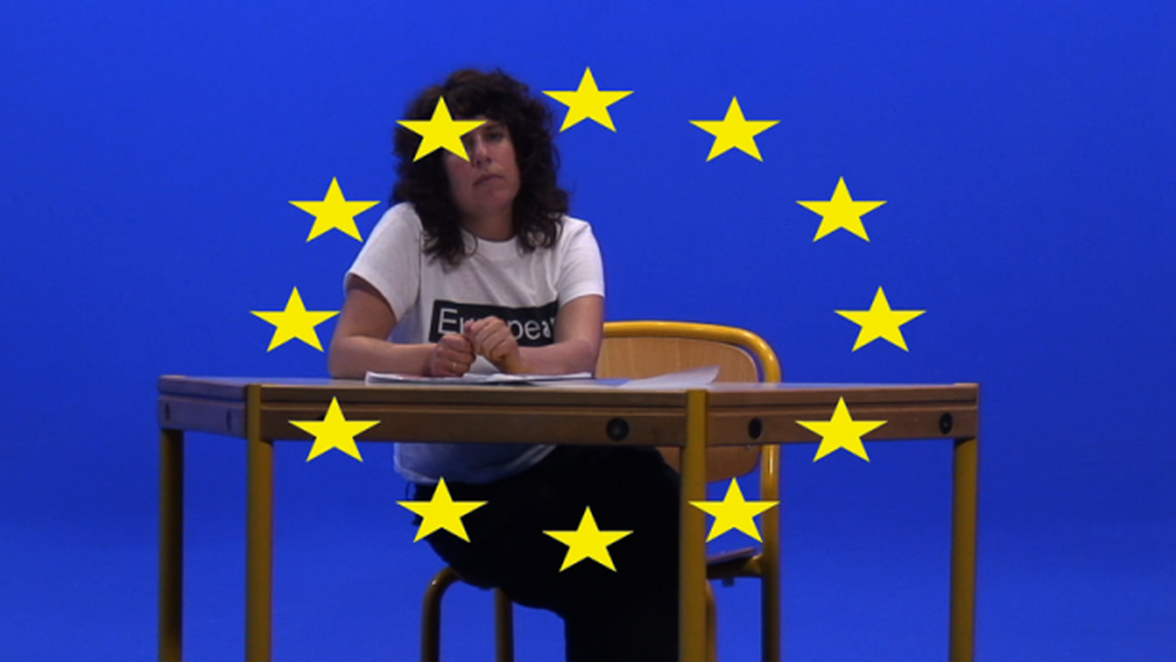
Created during a three-month residency at InterSpace in Sofia, Bulgaria (as part of 2007's At Home in Europe Project, which also included artists' residencies in Norway, Latvia, and the UK), How to Be European was inspired by Lewin's lessons in Bulgarian with Boris Angelov. "The lessons question who learns and who teaches and whether European identity exists for anyone but Americans?," she explains. "The work uses a mixed methodology of pre-written Socratic dialogues, bad acting, experimental visual techniques, educational television, obscure references and poetic news reading and covers concepts such as time, language, economics, flow and mobility, dog watching, and cultural presentation."
Lewin then considers the broader implications of these ideas: "Imagine a school where one learns how to be European in a changing Europe. Migration flows from East to West to East again. The EU is growing, yet doesn't include every 'European' country. It is getting more and more complicated to understand what European is and most importantly how to act European? In 1974 the sociologist Erving Goffman published his book Frame Analysis, which examined the way behaviour changes depending on the context. In a classroom we know how to act as teacher and student; can we extend this idea to Europe? When countries enter the frame of the EU do they become European?"
You can watch How to Be European on Lewin's PennSound author page, where you'll also find a number of supplemental links, including her homepage, where more of her work is on display.
Posted 7/3/2024
The earlier of the two, The Apple (1967), features a lyric and spoken interlude written by Koch, which was set to music by Tony Ackerman and Brad Burg, and sung by Kim Brody. In stop-motion and live action, it traces the sprawling adventures of its titular fruit. Running just one minute and fifty-four seconds, the film is nevertheless the subject of a marvelous essay by Daniel Kane — "Whimsy, the Avant-Garde and Rudy Burckhardt's and Kenneth Koch's The Apple" — in which he praises it for "the ways in which ideas of temporality, spontaneity, childishness, and parody are expressed within this tiny little film work," thus "revealing the latent and hilarious power of the whimsical affect."
The latter film, On Aesthetics (1999) has a sense of finality about it, coming during Burckhardt's last year and not long before Koch developed leukemia that would ultimately take his life in 2002. Running nine minutes and taking its name from the last poem in Koch's 1994 collection One Train, On Aesthetics — charmingly presented by "KoBu Productions" — features the poet's voice-over reciting the various micropoems contained under that title, from "Aesthetics of the Man in the Moon" and "Aesthetics of Creating Light" to "Aesthetics of Being with Child" and "Aesthetics of Echo," while Burckhardt's camera eye finds appropriate accompanying images, whether literary or abstract.
We're grateful to be able to share this work with our listeners, along with two other Burckhardt films: — The Automotive Story (1954) and Central Park in the Dark (1985) — which you can find here. Our Kenneth Koch author page also houses these films, along with a 1998 reading at our own Kelly Writers House and a few brief recordings from the St. Mark's Poetry Project.
Posted 7/1/2024
This weekend we announced the trio of authors that will be joining us next spring semester for the annual Kelly Writers House Fellows program. While there's much more info to follow in the coming weeks and months, we wanted to share the amazing line-up as soon as possible.
The program works in coordination with an undergrad course in which twenty or so students will read the work of each Fellow and then meet privately with them during that week's three-hour class session. Current UPenn undergrads interested in joining the class should contact KWH Fellows Coordinator Sophia DuRose at sdurose@writing.upenn.edu. In conjunction with the class the public will be able to take part in (either in person or from afar) the traditional Monday evening reading and Tuesday morning interview/conversation with each guest. Limited in-person seating for each event can be reserved by writing to whfellow@writing.upenn.edu.
Our full slate of 2025 Kelly Writers House Fellows will include: Patti Smith: February 24–25 Carmen Machado: March 31–April 1 Alice Notley: April 28-29 Of course, we'll keep our readers posted with more info as it becomes available. In the meantime, if you'd like to spend a little time some of the wonderful visitors we've had over the past 25 years, you can do so here.
Posted 6/27/2024
Today we're sad to share the news that poet, translator, and anthropologist Nathaniel Tarn has passed away just a few days shy of his 96th birthday. Born in France in 1928, Tarn's peripetitic life took him to Belgium, England, and eventually the US, where he'd teach at Rutgers for more than a dozen years before retiring to New Mexico in the mid-1980s.
His life as a poet spanned nearly 60 years, with the most recent publications including Atlantis, an Autoanthropology; The Hölderliniae; and Palenque: Selected Poems 1972-1984. Forrest Gander has praised Tarn's poetry, observing that "Tarn’s books have inspired a wild, almost religious devotion among readers. His work is a tremendous force field in which world and perception collaborate in the construction of innovative formal 'architextures' for a sensual language that has no like." He concludes, "Tarn is one of the most elegant and formidably intelligent minds in contemporary poetry. His books open up a means for us to be delighted again to belong to this world."
On PennSound's Nathaniel Tarn author page, you'll find a modest collection of recordings, including readings at SUNY Buffalo, Hoboken, Harvard University, the Louisville Conference (as part of the Lute & Drum series), London (for the Shearsman reading series) and our own Kelly Writers House. There are also a number of album releases, including two New Mexico readings from the VOX Audio collection and Tarn's 1985 collaboration with musician Billy Panda, I Think This May Be Eden. There's also a link to PoemTalk #42, which covers Tarn's poem "Unravelling / Shock."
We send our condolences to Tarn's family and his network of friends and fans worldwide.
Posted 6/25/2024
Filreis offers this lyrical take on the poems' impact in his write-up of the new episode: "The poems are texts in the sense of text inside the term textile. They are barely raveled. Phrase do and don't knit. A sweater is put on and overcomes mimesis. Fragmentation, the group agrees, is not the vibe — that’s too definitely indefinite." He continues, "Welish deploys phrasings on the page that convey the unraveling of work (and the meaning of work, especially women's work) rather than fractioning, shattering, and atomizing," before asserting, "There is a wholeness to the untangling."
You can listen to this latest program and learn more about the show here. PoemTalk is a joint production of PennSound and the Poetry Foundation, aided by the generous support of Nathan and Elizabeth Leight. Browse the full PoemTalk archives, spanning more than a decade, by clicking here.
Posted 6/24/2024
Today we're shining the spotlight on a historic recording of Etheridge Knight reading from Prison Poems at the Indiana State Prison. While we don't have precise info regarding the date of this event we believe that it took place towards the end of his incarceration, which ended in 1968. Of the eight years Knight served for armed robbery, he has said, "I died in 1960 from a prison sentence, and poetry brought me back to life."
When these segmented tracks were first introduced, our own Al Filreis commented that the "recording is marred by — or indeed perhaps enhanced and positively complicated by — the loud music playing in the background." You can judge for yourself.
Altogether, there are twenty-eight tracks, including an introduction and the following titles among many others: "Cell Song," "Hard Rock Returns to Prison from the Hospital for the Criminal Insane," "To the Man Who Sidled Up to Me and Asked: How Long You In Fer, Buddy?," "Poems for Black Relocation Centers," "For Malcolm, A Year After," and "Apology for Apostasy." You'll find these tracks, along with Watershed Tapes' album, So My Soul Can Sing and video footage of a 1980 reading for the Friends of the Scranton Public Library Poetry Series on our Etheridge Knight author page.
Posted 6/19/2024
Today we're proud to announce a new reading by Leonard Schwartz at New York City's Bowery Gallery. Recorded on March 16th of this year this event was held in conjunction with the exhibition Simon Carr: Play Ground and celebrated Horse on Paper (Chax, 2024), the third multi-genre collaboration between the two, joining Not a Snake (2023) and Salamander: A Bestiary (2017). Running just over seventy minutes the recording includes a gallery talk by Carr and Schwartz reading his poems from the volume.
You'll find this video on PennSound's Leonard Schwartz author page alongside a number of PoemTalk appearances and more than a dozen recordings of readings and performances going way back to the early 90s. Of course, we'd be remiss if we didn't also mention Schwartz's much-missed radio program Cross Cultural Poetics (2003–2018), which provided listeners with nearly 400 episodes showcasing the best of the worldwide arts scene. PennSound is proud to host the complete archive of the series.
Posted 6/19/2024
Shapiro's visit included two events, starting with a talk on painters Fairfield Porter and Jasper Johns. That was followed by a lengthy reading that we've segmented into 55 tracks, including 17 tracks of comments peppered amongst the poems, which include "To The Earth," "Falling Upwards," "Funeral For Jan Palach," "Snow at Night," "Stay Stay Stay Stay," "A Book of Glass," "The Boss Poem," "The Will," "Light Bulb," "Prayer for a House," "A Song For Rudy Burckhardt," "Winter Work," and "Colorful Hands," among many other.
You'll find these new recordings on Shapiro's PennSound author page, along with a modest collection of more recent recordings, including a pair of Segue Series events and a reading for Dia Art Foundation, and a 1976 ten-year memorial for Frank O'Hara at the Poetry Project, which also featured Joe LeSeuer, Patsy Southgate, Jane Freilicher (reading James Schuyler), Anne Waldman as MC, Kenneth Koch (reading "Awake in Spain"), Carter Ratcliffe, Tony Towle, Patsy Southgate, and Peter Schjedahl. Click here to start exploring.
Posted 6/15/2024
Today we take a closer look at one of the most iconic works by Canadian poet Daphne Marlatt in a unique setting. Like Light off Water: Passages from Steveston was originally released on CD by Otter Bay Recordings in 2008, and presents passages from Marlatt's beloved 1974 collaboration with photographer Robert Minden with musical embellishments written and performed by Minden and Carla Hallett. As Douglas Barbour observes, Steveston is "a carefully documented and deeply personal overview of the town in history," including its time as an internment camp for Japanese Canadians during the Second World War.
This is not the first time that Marlatt and Minden have revisited the Steveston project. The creators reconfigured the manuscript for a twenty-fifth anniversary edition, which separates the poems and photos into different portfolios, with both adding mew material. Speaking about the project as a whole, Marlatt notes, "There was something in Steveston which drew us, over and over again, and which our work attempted to enunciate — something under the backwater quiet, the river hum of comings and goings, the traffic of work, that was shouting at us to tell it." Writing in The WholeNote Magazine in 2009, Dianne Wells offered high praise for the album: "Marlatt's words bring you to the river's mouth and into a sensuous landscape of lives lived in canneries, fishing camps, on the sea and over time. Listen to the sounds of vintage waterphones, bowed carpenter’s saws, found object percussion and voice – a delicate resonance which surrounds Marlatt's poetic voicing, rhythm and imagery." She continues, hailing the music's ability to conjure up "the rippling and twinkling of water and light, together with haunting depictions of mysterious and erotic undercurrents mixed with the gentle beauty of the night sky.”
You can listen to all eight tracks — including "Imagine: A Town," "Moon," and "Intelligence (As If By Radio?" — by clicking here.
Posted 6/13/2024
First and foremost, there are eight tracks of the poet himself, taken from various sources and recorded between 1931 and 1937. "The Lake Isle of Innisfree" is best represented here, with three separate renditions (from 1932, 1936, and 1937) plus a brief track of Yeats discussing the poem in 1932. Other tracks include two stanzas from "Coole and Ballylee," "The Fiddler of Dooney," and "The Song of the Old Mother," plus a six-and-a-half minute track from 1936 in which Yeats discusses modern poetry.
You'll also find three readings by John Trimmer — of "The Wild Swans at Coole," "Leda and the Swan," and "Sailing to Byzantium" — as well as excerpts from a pair of titles read by Naomi Replansky, along with an extensive survey of Yeats poetry read by UPenn professor emeritus John Richetti. This Wexler Studio session from 2017 includes forty-two titles in total, among them "The Lake Isle of Innisfree," "September 1913," "Easter 1916," "Sailing to Byzantium," "Leda and the Swan," and "Crazy Jane Talks with the Bishop," along with many more. Finally, you'll find a link to PoemTalk Podcast #66 from 2013, in which Taije Silverman, Max McKenna, and John Timpane joined Al Filreis to discuss "The Lake Isle of Innisfree."
Posted 6/12/2024
Today we present a new batch of recordings from Michael Ruby, which come from a 2023 session engineered by Chris Funkhouser. Here, in ninety-three individual tracks, we discover the majority of Ruby's latest collection, Close Your Eyes, Visions, which was published by Station Hill Press earlier this year. As that comma in the middle of the title suggests, Ruby's latest consists of two discrete sequences, and the recordings are presented as such. Close Your Eyes is represented by fourteen poems in series running between four and ten minutes in length. Visions takes a very different form, with a grand total of seventy-eight poems, dates serving as titles, which span from 2007 to 2013. On PennSound's Michael Ruby author page you'll find these sequences as well as complete studio recordings of many of the poet's books, including The Star-Spangled Banner, The Mouth of the Bay, The Edge of the Underworld, Inner Voices Heard Before Sleep, and Compulsive Words, along with readings from 2000 to the present.
Posted 6/7/2024
Today we're highlighting a real treasure from the audio archives of Robert Creeley: Allen Ginsberg's appearance on Stonewall Nation — hosted by Alex Van Oss, on Buffalo's WBFO-FM — during a visit to SUNY-Buffalo in the fall of 1978.
Joined by Peter Orlovsky and Al Hershberger, Ginsberg, no stranger to speaking candidly about his queerness (or any other topic), holds forth on a variety of topics, from his closeted youth and coming out to his family, along with the Beat Generation's relationship to nature, and contemporaneous political topics like California's Briggs Amendment — which he initially approaches from a literary perspective, highlighting classic authors (from Whitman to Wilde, Genet to Plato) who California teachers would be banned from assigning — as well as the Rocky Flats Nuclear Plant.
The show begins with a performance of "Gospel Noble Truths" (in a different arrangement than what would become Ginsberg's standard, and with some slight lyrical variations), and also includes excerpts from the recently-written "'Don't Grow Old,'" concerning Ginsberg's coming out to his father, and ends with a performance of "Everybody Sing" (which famously asserts that "everybody's just a little bit homosexual, whether they like it or not"). To listen, click here to visit our Allen Ginsberg author page.
Posted 6/7/2024
Now in its twenty-fourth year, Belladonna* is "a reading series and independent press that promotes the work of women writers who are adventurous, experimental, politically involved, multi-form, multicultural, multi-gendered, impossible to define, delicious to talk about, unpredictable, and dangerous with language." You can watch these latest additions by clicking here, and there are countless amazing recordings spanning the series' complete history waiting for you to discover on PennSound's Belladonna* series page.
Posted 6/3/2024
June 3rd is the birthday of Beat Generation legend Allen Ginsberg, who would have turned 98 today. For many generations, Ginsberg has served as an important gateway to poetry — I've written and spoken about my own teenage experience discovering his work and its life-changing effects — and in these turbulent times it's well worth remembering that for Allen poetry and politics were inextricably linked, from his earliest scribbles through to his deathbed writings.
From the civil rights movement to queer liberation, nuclear disarmament to environmentalism, censorship to anti-imperialism, Ginsberg (who originally aspired to being a labor lawyer) tirelessly fought the good fight on behalf of the oppressed and challenged those in power to do better. We see it in his dream cabinet in "Death to Van Gogh's Ear," his demands for the Clinton presidency in "New Democracy Wish List," and hundreds more poems written over his fifty-year career. Moreover, a spirit of radical empathy guided both his work and his worldview: "I'm with you in Rockland," he pledges to Carl Solomon in the footnote to "Howl," his most iconic poem, and undoubtedly he would be with us in Minneapolis, in Ferguson, in Baltimore, in Cleveland, in Sanford, and every other battleground in our long and ongoing struggle for justice.
We are honored to be able to share a startling array of recordings — readings, songs, interviews, talks, and more — on PennSound's Allen Ginsberg author page, which spans more or less the entirety of his writing career, from a few 1956 sessions all the way up to his legendary residency at the Knitting Factory in 1995, during which he gave authoritative readings of his three finest long-form pieces: "Howl," "Kaddish," and "Wichita Vortex Sutra." You'll find the majority of Ginsberg's most iconic poems — aside from the aforementioned titles, "A Supermarket in California," "America," "Sunflower Sutra," "The Lion for Real," "Don't Grow Old," "Plutonian Ode," "Gospel Noble Truths," "Do the Meditation Rock," "Hum Bom," and "After Lalon" are all there — but the real treat for diehard fans are the more obscure titles, the telling asides between poems, and the pieces shared with audiences in their earliest drafts. To hear Ginsberg read "Autumn Leaves" or "Manhattan Mayday Midnight" or "Tears" or "To Aunt Rose" or "Transcription of Organ Music" or "After the Big Parade" is as much a delight as encountering them for the very first time. You can start exploring by clicking here.
Posted 5/31/2024
Today would have been the 205th birthday of poetic pioneer Walt Whitman, who resides permanently just across the river from us in Camden, NJ. While Whitman left behind no recordings of his poetry — you might be familiar with a wax cylinder recording of excerpts from the late poem "America" that's been deemed unlikely to be the poet himself — but that doesn't mean that we don't have recordings of Whitman's work for your enjoyment. Today we'll highlight performances and interpretations by three poets. We start with UPenn professor emeritus John Richetti, who has recorded a wide variety of Whitman's work over the years, including "O Captain! My Captain!," "When Lilacs Last in the Dooryard Bloom'd," "Crossing Brooklyn Ferry," "The Sleepers," "Goodbye My Fancy," "I Sing the Body Electric," and "I Hear America Singing," and sections 1 and 2 of "Calumus." You'll find these tracks on a special page containing all of Richetti's renditions of Whitman's work, which also includes "Song of Myself" in its entirety, among other titles. Sticking with "Song of Myself," we're also lucky to have a 1974 recording of Aaron Kramer reading sections I-XXXII of that poem, and Basil Bunting winds things up with a 1977 reading at the University of Newcastle-upon-Tyne, where he read "Out of the Cradle Endlessly Rocking" as part of a performance that also included work by Louis Zukofsky, Ezra Pound, Thomas Wyatt, and Edmund Spenser. You can click on any of the poets' names above to be taken right to the mentioned recordings.
Posted 5/30/2024
Today we are proud to present the latest recording session from Chris Funkhouser and George Quasha, their first of the new year. Consummate PennSound Daily readers will recall that Funkhouser has been periodically recording the complete poetic works of his friend and neighbor Quasha since at least 2017 to the benefit of listeners worldwide. This latest session — recorded in Barrytown, NY on March 18th of this year — consists of strange beauty by stranger attraction, a "preverbs" project that's part of the larger hearing other text and runs just over one hour and forty minutes. You can read selections from strange beauty by stranger attraction in both Marsh Hawk Review and SPACECRAFTPROJECT. You'll find these and many more recordings on PennSound's George Quasha author page, along with lengthy selections from many of his books including w aking from myself, g nostalgia for the present, n ot even rabbits go down this hole, dowsing axis, hearing other, the ghost in between, verbal paradise, glossodelia attract: preverbs, the daimon of moment: preverbs, scorned beauty comes up behind: preverbs, things done for themselves: preverbs, and polypoikilos: matrix in variance: preverbs, among others. Click here to start listening.
Posted 5/27/2024
Today is Memorial Day in the United States and at PennSound we're marking the occasion by revisiting Ted Berrigan and Anne Waldman's collaborative masterpiece, "Memorial Day," and our recording of their May 5, 1971 reading of the work in its entirety at the Saint Mark's Poetry Project.
This recording is notable not only because "Memorial Day" is a landmark collaboration between two of the New York School's finest poets, but also due to its seeming rarity. Berrigan and Waldman were rumored to have only read the poem together and in its entirety once — in fact, "Memorial Day" was composed specifically for their joint reading in the spring of 1971 — and while the event was recorded, it would seem that the tape had been missing for several decades, presumably lost forever.
My brief Jacket2 essay from 2010, "Recovering 'Memorial Day,'" is both a rumination on the poem itself and a retelling of its being lost and found again in the reel-to-reel tape collection of Robert Creeley. To listen to the recording directly, you can click here. In a wonderful twist, video footage of a 1973 reading of the poem by Berrigan and Waldman has since been located, and you can watch that here.
Posted 5/22/2024
Filreis starts his write-up of the new episode by explaining the source of the recording under discussion: "We don't alas have a recording of Crane reading this poem; nor do any recordings of Crane survive. But PennSound's Hart Crane author page includes two of Crane's poems as performed by Tennessee Williams! So before our discussion began, we listened to Williams's transatlantic/southern American inflection." He continues, "Crane the Ohioan who spent a good deal of time around working-class New Yorkers, would not have sounded this way. Yet listen and get a sense of how our talk was perhaps affected by Williams's performance. Nonetheless we heard in Crane's poem major traces of Whitman, Eliot, O'Hara, Schuyler, the Romantics (that window casement...), Samuel R. Delany, even Jack Kerouac."
You can listen to this latest program, read "The Harbor Dawn," and learn more about the show here. PoemTalk is a joint production of PennSound and the Poetry Foundation, aided by the generous support of Nathan and Elizabeth Leight. Browse the full PoemTalk archives, spanning more than a decade, by clicking here.
Posted 5/20/2024
As we ease into summer break let's check in with the Boise State University MFA Reading Series and their spectacular spring roster of readings. This past fall's lineup of Peter Gizzi, Dan Beachy-Quick, Srikanth Reddy, and Alice Notley was quite formidable and this semester kept up the pace with five events held between February and April.
First up on February 16th was Christina Piña, who was introduced by Martin Corless-Smith. CAConrad followed on March 8th, with an introduction by Trey Hayden — one of two March readings, along with Jennifer Moxley (who was introduced by Savy Butler) on March 29th. Finally, the program hosted two events during National Poetry Month: Endi Bogue Hardigan and Rob Schlegel (introduced by Caleb Merritt and Christofer Arbudzinsky, respectively) on April 5th, and Ian Dreiblatt on April 12th (with introduction by Adam Ray Wagner). Click here to visit PennSound's Boise State University MFA Reading Series homepage, where you can listen to all of the aforementioned readings. While you're there, check out our repository of recordings made between 2010–2013 under the curation of Corless-Smith, including sets from Alan Halsey, Susan M. Schultz, Ben and Sandra Doller, Forrest Gander, Charles Bernstein, Michael Palmer, Jennifer Moxley, Bhanu Kapil, Myung Mi Kim, Renée Gladman, Tom Raworth, Lisa Robertson, Alice Notley, and Maggie Nelson. We thank current coordinator Sara Nicholson and grad student Adam Ray Wagner for their help in reviving the series page.
Posted 5/18/2024
Here's a hidden gem from our archives that deserves your attention: a half-hour video of David Antin discussing Kathy Acker — who he calls "a dazzlingly charming and funny and brilliantly powerful writer, whose work I've always felt very close to" — as part of a symposium on her work held at New York University on November 8, 2002.
"Let me point out I knew Kathy before she was the Kathy Acker you all know," Antin begins, discussing his first meeting her at UC San Diego in 1968, when she was working as a teaching assistant and associating with other "refugees from Brandeis," along with her husband Robert (nominally a student of Marcuse). He goes on to discuss "the climate in which Kathy came to be a poet" — specifically "the proclaimed sexual revolution" and "the year of the assassinations" (Antin's arrival in the city coincided with Robert Kennedy's murder and Valerie Solanas' shooting of Andy Warhol) — then recalls the guidance that he provided to young and aspiring writers like Acker, Mel Freilicher, and others from their social circle, the conceptual art projects he worked closely with (including a Fluxus retrospective), and associations with figures like his wife, Eleanor, Jerry and Diane Rothenberg, Lenny Neufeld, George Quasha, et al., all of which proved to be very influential. "She was exposed to all of these people in various ways that were useful to her," he observes.
He goes on to talk about her compositional use of constraint ("Her engagement was with so many things but she had to restrain herself to not be all over the place all at once."), her means of getting her work out to wider audiences, and the qualities that made her a singular talent: "Kathy had both intelligence and energy, and she had desire [...] It was the intensity of her desire for life." It's a gossipy, raucous recollection that also reveals deeper truths about how Acker came into her own. You can watch it here.
Posted 5/8/2024
Today we're highlighting our author page for Canadian poet and critic Trish Salah.
Our holdings begin with the poet's appearance at the 2009 ADFEMPO (Advancing Feminist Poetics and Activism) conference, organized by Belladonna*, which took place on September 24th and 25th of that year. Salah appeared as part of a panel on "Body as Discourse" chaired by Kate Eichhorn that included Joan Retallack, Laura Smith, Nathalie Stephens (Nathanaël), and Ronaldo V. Wilson in addition to Salah, which explored "questions of the body, referentiality, remapping bodies and borders, intertextuality, narrativity, aesthetics, and the challenges of de-essentialization as we scrutinize 'female,' 'queer,' 'raced' and 'othered' bodies."
Beyond that panel, we had a brief set as part of a Belladonna* Reading Series event on Transfeminism and Literature from 2012, and Salah's Segue Series reading at the Zinc Bar in March 2013. Since then, we've added several more recordings, including "Nevada: A Reading and Panel" that also included Imogen Binnie, from the Young Centre for Performing Arts in 2013; 2014's Wanting in Arabic: A Conversation with Poet Trish Salah," recorded as part of the Asia Pacific Forum for NYC's WBAI-FM; and a 2014 reading at the East Bay Poetry Summit, hosted by the Manifest Reading and Workshop Series. There's also a very exciting PennSound Podcast episode (#57) in which Christy Davids interviews Salah and Salah reads her poetry, including "Two Self Portraits," "Interlude for the Voice," "Future Foundered," and "Gossels in Fugue."
You can listen to any and all of the recordings mentioned above by clicking here.
Want to read more? Visit the PennSound Daily archive.
|
New at PennSound
- Rachel Blau DuPlessis's complete grid of Drafts, 1988–2024
- Piotr Gwiazda reads from Grzegorz Wróblewski's Dear Beloved Humans, February 7, 2024
- Adam Fieled reading from Something Solid: Portal-Ways
- Leonard Schwartz with Simon Carr at Bowery Gallery, 2024
- Michael Ruby reading from Close Your Eyes, Visions, 2023
- David Shapiro reading and talk for UMass Amherst Visiting
Writers Series, Spring 2004
- Anne-Marie Albiach reading ÉTAT, Hotel de Ville, Neuilly, France, October 10, 2007
- Spring 2024 Boise State Reading Series: Christina Piña, CAConrad, Jennifer Moxley, Endi Bogue Hardigan, Rob Schlegel, and Ian Dreiblatt
- Belladonna* GIST #2 featuring Kaleem Hawa and Rachelle Rahmé, Center for Brooklyn History, March 23, 2024
- George Quasha reading strange beauty by stranger attraction, Barrytown, NY, March 18, 2024
- Richard Foreman at Segue / Artist Space, New York City, March 16, 2024
- Belladonna* GIST #1 featuring Peter Myers and Jameson Fitzpatrick, Brooklyn Central Library, February 24, 2024
- Six Poems by Giovanni Fontana
- Barbara Henning reading with Jaime Manrique, St. Mark's Poetry Project, January 27, 1993
- George Quasha reading crossroads angelics, Barrytown, NY, December 30, 2023
- Charles North reading for the William Corbett Poetry Series, MIT Virtual Event, April 21, 2022
- VOX Audio Collection, 2005–2011
- Fall 2023 readings at Boise State University's Hemingway Center: Peter Gizzi,
Dan Beachy-Quick, Srikanth Reddy, and Alice Notley
- New author page: Davide Balula
- Hugh Seidman: New Author Page
- Paul Dutton's Oralizations, actuellecd, 2005
- Richard Foreman's production of John Zorn's Astronome,
2010, film by Henry Hills
- Jena Osman and Adam Pendleton reading for the launch of A Very Large Array, Artbook @ MoMA PS1 Bookstore, October 21, 2023
- The Swan 20: Dorota Czerner, September 2, 2023
- Tracie Morris and Tongo Eisen-Martin performing for the Flow Chart Foundation, Hudson, NY, September 22, 2023
- Harryette Mullen on Morton Marcus's "The Poetry Show," KUSP, March 18, 1987
- Ann Lauterbach reading at 'T' Space, Rhinebeck, NY, July 8, 2017 and July 16, 2023
- Ron Padgett reading for the Yale Literary Magazine, November 1, 2022
- A reading with Chris Martin and Adam Wolfond, February 15, 2023
- Julia Bloch reading Valley Oak for PoemADay, August 12, 2023
- Clark Coolidge, The Painter's Poet: a talk on Philip Guston, Poets House, April 4, 2013
- Philip Whalen reading at National Poetry Festival, Allendale, MI, July, 1971
- Lew Welch reading The Song Mt. Tamalpais Sings, Planning and Conservation League, date unknown
- Philip Whalen reading at the Unicorn Bookshop, Santa Barbara, February 6, 1967
- Performance of Louis Zukofsky's "A"-24 Act I at UCSD New Writing Series, April 11, 1986.
- Leslie Scalapino reading in the USCD New Poetry Series, May 9, 1979
- Jerome Rothenberg and Bertram Turetzky Performing For Poet's Voice and Contrabass, 1984
- Hoa Nguyen reading at Kelly Writers House, February 28, 2023
- Joan Retallack reading and conversation for Kelly Writers House Fellows Program, February 20–21, 2023
-
- Barbara Henning and Maureen Owen reading from Poets on the Road, May 27, 2023
- Ron Silliman and Lyn Hejinian reading, November 6, 1995
- Robert Creeley reading for Lannan Foundation, Los Angeles, April 16, 1990
- Thin Air Lectures with Ron Silliman, Alice Notley, Bernadette Mayer, and Ron Padgett, St. Marks Church, May 1988
- Kass Fleisher interview on The Bear River and the Making of History, Access Utah, Utah Public Radio, June 25, 2004
- Cliff Fyman reading, San Francisco, CA, June 11, 2023
- Charles Olson reads from Maximus Poems IV, V, VI, c. 1969
- The Marginalization of Poetry, Segue Series at Double Happiness, NYC, March 22, 1997
- Adam Fieled reading from Equations: The Thesis Episodes, Carriage Hill, Plymouth Township, 2023
- New videos for Aaron Kramer
- Thomas Devaney reading at Wexler Studio, Kelly Writers House, University of Pennsylvania, May 30, 2023
- New video of Joan Retallack for Alternative Poetries and Alternative Pedagogies Reading and Discussion at the Kelly Writers House, February 28, 2001
- Clark Coolidge reading from A Book
Beginning What and Ending Away for 80 Langton Street Writers In Residence Readings,
October 15–21, 1979
- Vincent Katz reading at Green Arcade, SF, November 18, 2022
|

